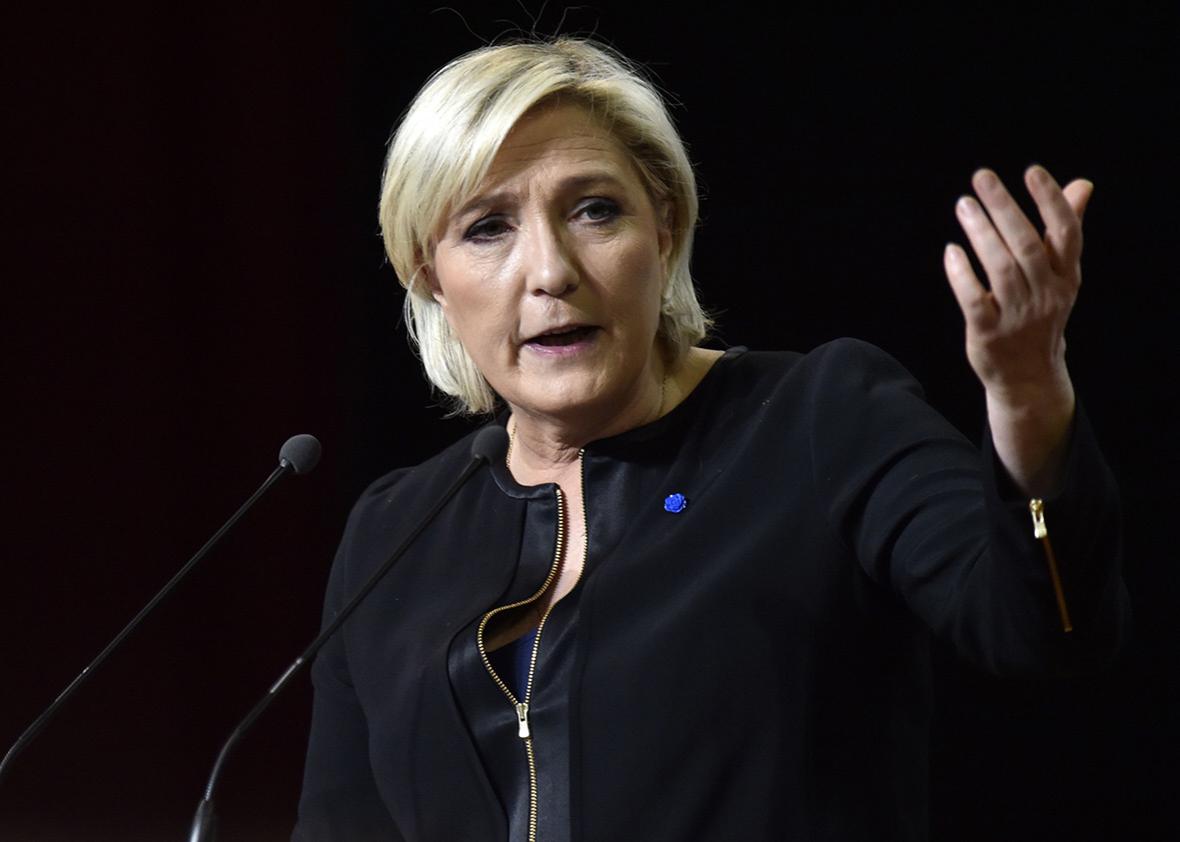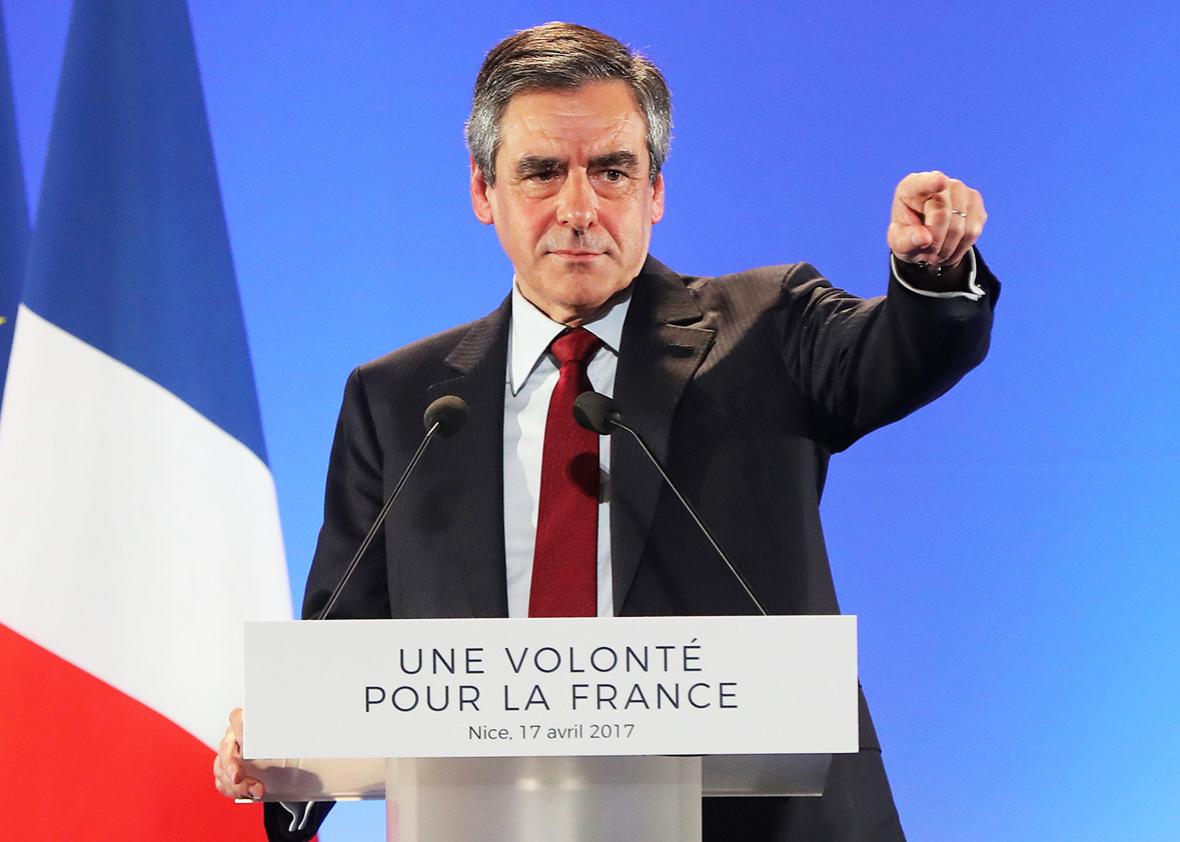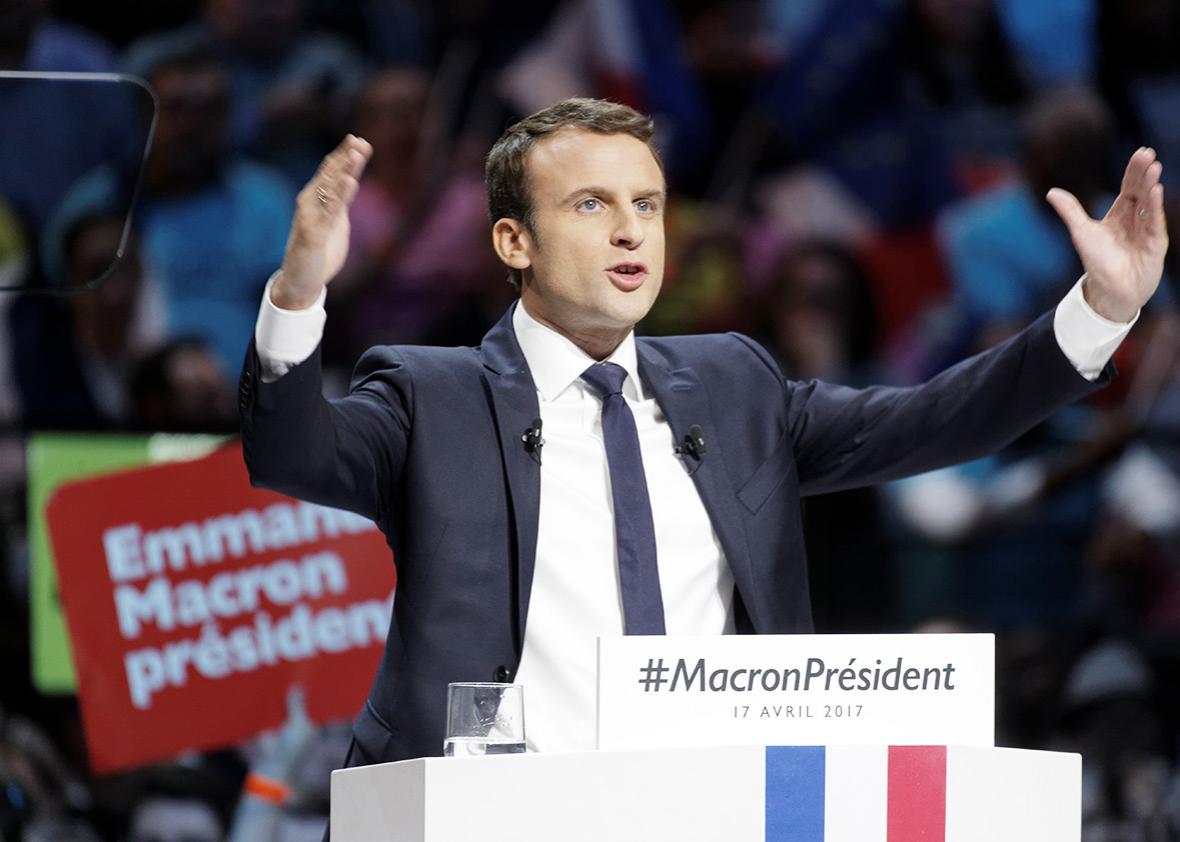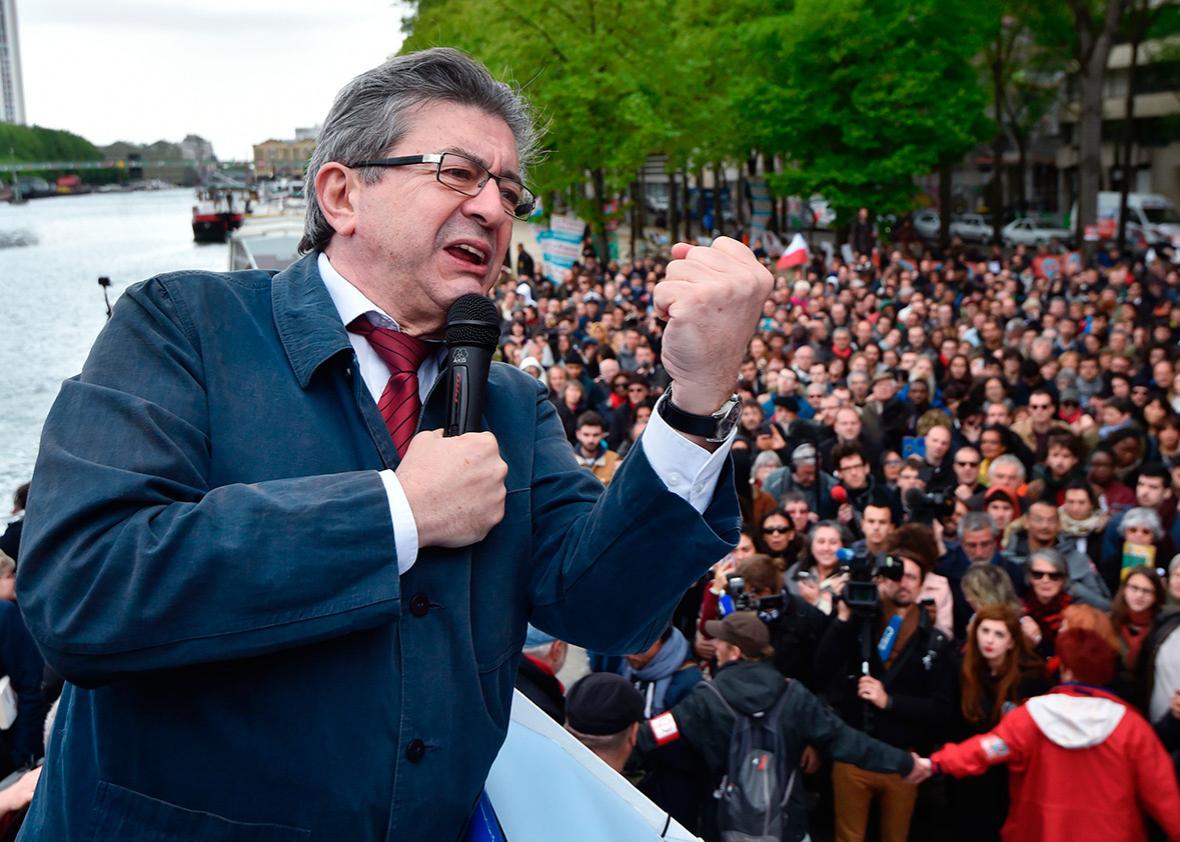“The hero of the game? Bah, that’s me,” French presidential candidate Jean-Luc Mélenchon boasts in a YouTube video about Fiscal Combat, a video game played by millions of French voters over the last two weeks. “You confront oligarchs. It’s a battle. You capture them. You shake them. And that makes euros fall out of their pockets.”
The clip briefly cuts away from Mélenchon to show his campaign manager hunched over a laptop, pulverizing yet another oligarch to the accompaniment of a chiptune soundtrack. “Those Euros?” Mélenchon asks when the camera returns to him. “You can put them toward the common good!”
For many years, Mélenchon has been about as marginal a political figure as his endorsement of Fiscal Combat might suggest. After breaking with the center-left Parti Socialiste of President François Hollande, he has called for a 100 percent tax on incomes over 400,000 euros (about $426,000) and endorsed dictators such as Hugo Chavez. And yet, the latest polls see Mélenchon in a dead heat with centrist Emmanuel Macron, conservative François Fillon, and far-right populist Marine Le Pen. Any two out of those four might come out on top in the first rounds of the upcoming presidential elections.
In other words, less than a week before the first round of the election, and less than three weeks before a runoff between the two leading candidates that will determine the next inhabitant of the Élysée Palace, the country’s political future is completely up in the air. France might soon be ruled by a self-described communist, by an untested centrist whose political movement was founded less than a year ago, by a traditional conservative under investigation for blatantly corrupt practices, or by the far-right leader of a party with deep fascist roots.
To explain just how terrifying this situation is, let me give you a quick primer on the four candidates who might soon get to shape the country’s future.

Alain Jocard/AFP/Getty Images
Marine Le Pen
Ever since Britain voted to Brexit and the United States elected Donald Trump, commentators have feared that Le Pen would win the French presidential election and complete the populist trifecta. If this outcome does come to pass, the consequences would be disastrous: Le Pen’s election would not only threaten the future of the European Union but also call the survival of French democracy into doubt.
Le Pen is the leader of the Front National. Founded by Marine’s father, Jean-Marie Le Pen, the party has long evinced sympathy for the Vichy regime, which collaborated with the Nazis in World War II; trafficked in every form of racism and anti-Semitism; and cast doubt on the legitimacy of the French constitutional order. Since taking over the party, Marine—a plain-spoken woman with a proletarian accent, a lively manner, and considerable wit—has put constant criticisms of France’s Muslim minority at the center of her rhetoric. But at the same time, she has tried to “detoxify” the party by styling herself as a defender of the republic and, at times, even a champion of gays or Jews. This strategy paid off: Much more popular than her father ever was, she has long topped first-round polls.
But though Le Pen has tried to soften her party’s rough edges, her core beliefs and positions remain extreme. She wants France to leave the European Union, has floated a Trump-style travel ban on Muslims, and recently flew to Moscow to pledge allegiance to Vladimir Putin. Even the varnish she has put on the party seems to be wearing thin: At a recent campaign appearance, for example, Le Pen refused to accept France’s responsibility for rounding up more than 13,000 French Jews who were ultimately handed over to the Nazis and transported to Auschwitz.

Valery Hache/AFP/Getty Images
François Fillon
At the outset of the primaries for the center-right Républicains, there were two big questions: Who would manage to get the second spot in the runoff against Le Pen? And who would have the best chance to beat her? For most observers, that person was likely to be Alain Juppé, a moderate and well-liked former prime minister who could likely attract the support of a lot of centrist and leftist voters in a runoff against Le Pen. But a few weeks before the primary, Juppé faded, only to be beaten handily by Fillon.
Beyond the base of the Républicains, Fillon was never going to be especially popular. Both socially and fiscally conservative, he voted against same-sex marriage, positioned himself as an enemy of the welfare state in the mold of Margaret Thatcher, and maintained extremely friendly relations with Russia. It is little wonder, then, that French observers were very wary of a potential runoff between Fillon and Le Pen: Many left-wing voters, they feared, would refuse to turn out to vote for Fillon in the second round, potentially handing Le Pen the keys to the Élysée.
And that was before the corruption scandal hit. Fillon, the Canard Enchaîné revealed, has employed both his own wife and his own children as parliamentary assistants in the past, funneling close to $1 million of taxpayer money to his own family members. To make things worse, none of them seem to have done actual work for him. Under growing pressure to vacate the party’s nomination, Fillon promised that he would abandon his campaign if he was put under formal investigation. Soon enough, he was—and yet he didn’t.
The prospect that Fillon might face Le Pen in the second round is terrifying for two reasons: First, there is every reason to think that he might lose. And second, even if he did win, he would make a terrible president—close to the Kremlin, regressive on social issues, pursuing an unimaginative course of cuts without investment in the economy, and entering office under the stinking cloud of an ongoing investigation for corruption.

Sylvain Lefevre/Getty Images
Emmanuel Macron
In the wake of Fillon’s corruption scandal, the political landscape was looking bleak: Le Pen was riding high, Fillon was laid low by scandal, and President Hollande’s Parti Socialiste had nominated Benoît Hamon, an uncharismatic lightweight who was barely capable of holding the allegiance of his own party. In this dark hour, Macron appeared as the would-be savior of the political center—and the French republic.
At 39, Macron is by far the youngest major contender, yet he has already earned one of the most impressive CVs: A graduate of the elite École Nationale d’Administration, he has been an investment banker, a senior civil servant, a presidential aide, and France’s minister for the economy. After leaving both the Hollande government and the Parti Socialiste in dramatic fashion, Macron set up his own political movement, En Marche (On the Move).
While Macron has deliberately kept his political positions vague, it is clear that his overall instincts are centrist on economic issues and liberal on social issues. A believer in both the welfare state and free enterprise, Macron has advocated for moderate cuts to the French civil service while promising to modernize French entitlement programs by drawing on the example of Denmark and Sweden. An eloquent defender of a multiethnic society, Macron has also opposed calls for more restrictions on the Muslim veil, advocated the right of same-sex couples to adopt children, and invited American climate scientists whose work is threatened by Trump’s policies to move to France.
“To be a patriot,” he said at a rally in Marseille, home to hundreds of thousands of immigrants,
that is not the Front National, the hatred that will lead to civil war. To be a patriot is to want a strong France, open to Europe, and faced toward the world. And when I look at Marseille, I see a French city, marked by 2,000 years of history, of immigration, of Europe. … I see Armenians, Italians, Algerians, Moroccans, Tunisians, Malians. … But what do I really see? I see the people of Marseille. I see the people of France.
Macron’s mixture of charisma and competence, of youth and ideological flexibility, unexpectedly propelled him to the top of the polls. For the last months, it became the received wisdom that he would qualify for the second round—where he would handily beat Le Pen. It is thanks to Macron that the sense of impending doom about the French elections that had prevailed in the aftermath of Trump’s victory gradually dissipated and even gave away to complacency in the first months of the year.
But then, over the course of the last weeks, Macron gradually began to slide in the polls. After middling performances in TV debates, his support—which had always been soft—began to slip away. Today, Macron retains by far the best chances of beating Le Pen if he actually qualifies for the second round, but it is looking less and less certain that he will.
Jean-Luc Mélenchon
Which brings up back to the protagonist of Fiscal Combat.
Even his political enemies admit that Mélenchon is a man of real talent. Smart and cultured—an adjective that still counts as a political asset in France—he speaks with great eloquence and refreshing pugnacity. Few French politicians can inveigh against injustice with the pleasing turns of the tongue that seem to come so naturally to him.
But while Mélenchon loves to intone calls for justice in a booming baritone, the actual policies he favors would likely be a disaster for the French economy and for French democracy. His critics have understandably focused on the unworkable idea of capping salaries at 400,000 euros. But this is merely symptomatic of a much larger failure: Mélenchon does not have the beginning of a vision for how to make France’s economy more vibrant or for how to sustain the jobs that finance the country’s admirable welfare state. Politics, for Mélenchon, really is like a giant game of Fiscal Combat: So long as the people’s leader can punch enough rich people, the money for public projects will magically appear.
But it is in the realm of foreign policy that the full extent of Mélenchon’s thuggishness becomes apparent. His naked anti-Americanism is only to be expected, I suppose. (“Yankees,” he said on one occasion, “represent everything I detest. A pretentious and arrogant empire, composed of uncultured rubes and pitiable cooks.”) So is his admiration for far-left dictators from Hugo Chavez to Fidel Castro. But his circle of dictatorial sympathy seems to extend even beyond the usual suspects. And so all he sees in Syria is a rightful ruler, Bashar al-Assad, who is being overthrown in a cynical bid for oil and gas. All he sees in the Ukraine is the imperial ambitions of the West. All he sees in China is the admirable ability of two-dozen members of the Politburo of the Communist Party to hold 1.2 billion people under their control. And all he sees in Tibet is the would-be perpetrators of “Buddhist sharia.”
Most French people would find much of Mélenchon’s program abhorrent. But because his surge came late in the game, his policies will barely come under scrutiny before the first round—and so he now has a small yet real chance of sneaking into the second round, possibly facing off against Le Pen in a battle of the extremes unprecedented anywhere in Western Europe since World War II.
* * *
The election of Emmanuel Macron would be a sensation. For half a century, the French presidency has alternated between the representative of the main center-left party and the representative of the main center-right party. Never before has the centrist leader of a recently founded political movement come remotely close to conquering the Élysée.
If Macron does win, his presidency would by no means be an easy proposition. Without the support of a major political party, Macron is unlikely to garner significant support in legislative elections this June. And so he will face great difficulty in putting his modernizing agenda into practice even if he does win high office: Radical though his election would be, it would likely open the door to yet more gridlock.
But the alternatives to Macron are far, far worse. The election of Fillon would strengthen Putin’s hand, give French voters even better reason to conclude that their country’s political class is controlled by the corrupt and the self-serving, and deepen popular disenchantment with democracy. Meanwhile, the election of Le Pen or Mélenchon would wreak instant chaos, call France’s membership in the European Union in doubt, and undermine the most basic protections of liberal democracy. Macron is unlikely to fulfill the outsized expectations of his most ardent supporters. But his election is the only realistic way to stave off disaster.
